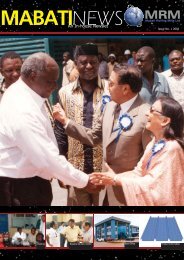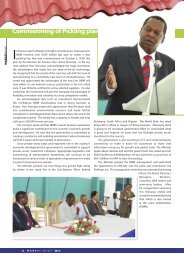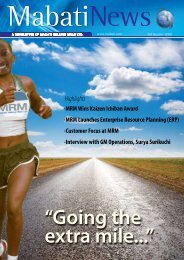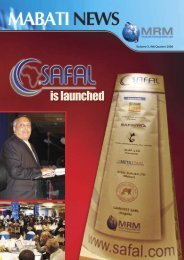Safal Group Company - Mabati Rolling Mills
Safal Group Company - Mabati Rolling Mills
Safal Group Company - Mabati Rolling Mills
- No tags were found...
Create successful ePaper yourself
Turn your PDF publications into a flip-book with our unique Google optimized e-Paper software.
MEET OUR DIRECTORMABATINEWSA jack of alltrades and amaster of allBy George MathewUniversity don, bank director, companychairman, ambassador, MRM Director–all these epithets still do not capturethe essence of the humble, soft spokenDr Benjamin Kipkorir. He had some veryinteresting things to say. Read on.<strong>Mabati</strong> News: Sir, if I may be permittedto say so, you have had a diverse career,Cambridge educated during the sixties,Head of History at the University of Nairobi,Executive Director, Kenya Commercial Bank,Director, Industrial Development Bank,Kenya’s Ambassador to the United Statesof America, decorated as an Elder of theBurning Spear, I am sure the list goes on.What were the most memorable things ofthis period? Would you wish to have livedyour life differently if you had a chance?Dr Kipkorir: I have had an excitingtime. I have had the chance to work inlocal government administration, I haveworked in the university, I have run aresearch institute then I got into banking,which opened a whole new world for me,new friends and new activities. This waswonderful. The appointment to Washingtonas ambassador came as a crowning pieceto my career. I have had different jobs andgot the satisfaction of the experiences butthrough not pursuing one career. If I coulddo it differently I would wish to have a linearcareer in one organisation.<strong>Mabati</strong> News: Are there any memorablemoments or incidents from all these years?Dr Kipkorir: My very first assignmentas a local government officer in Sirikwa,Eldoret in 1965 allowed me to meet allkinds of people. One December I washosting a Christmas party for the councillorsand important members of the Eldoret civiccommunity. A white councillor came up to meand asked: “Could I bring my wife?” I replied,“But the card says Mr and Mrs.” To which heresponded: “The problem is that my wife isAfrican.” I looked at him and said, “But I am alsoan African.” And this was the very first time thisAfrican lady married to a white man was broughtto a public arena.<strong>Mabati</strong> News: Any other experiences Sir, fromyour days at the University of Nairobi?Dr Kipkorir: I joined the University of Nairobiin 1970, the year it was inaugurated out of theUniversity of East Africa. It was a time of greatpromise and excitement. The University wasindependent, young and alive with enthusiasticscholars. Despite claims that the quality ofeducation at UoN has declined over the years Iam happy to note that there are efforts to revivethe standards of education there.<strong>Mabati</strong> News: Any experiences from your days asAmbassador to the US?Dr Kipkorir: The one exciting experience isthat of fighting American restrictive rules againstimport of Kenyan textiles. I was right at the centreof that. The Minister of Trade and Industry atthat time, Hon. Kiruki M'Mukindia asked me togo and pursue the export markets for Kenyantextile goods. Kenya textiles exports to America,especially pillowcases and sheets were risingrapidly in 1994. This alarmed Americans andthey imposed quotas. One US Congressman wasso upset about this because he felt it was betterfor the African countries to benefit from tradewith America than receive aid and he proposedthe African Growth and Opportunity Act. I testifiedtwice, once at the US Trade Commission andagain at the US Committee of the Congress.<strong>Mabati</strong> News: How intense is the lobbying in theUS?Dr Kipkorir: US legislation is a functionof many factors and forces. There are interestgroups or constituencies. The powerful cottonlobby produce cotton at subsidised prices.The textile lobby are those who manufacturetextiles with protection from the US government.When an African trade minister meets with aUS trade representative, they are on differentwavelengths. While the African Minister has allthe authority to make a decision on the spot,the US official cannot do so. He has to consulthis constituents and the forces behind them.He follows a due process where all interests arebrought to the table, evaluated and eventuallyan American position arrived at. Then he is ableto make a decision. Then they start lobbying.They have all our statistics, know all our players,they downplay our strengths and highlight ourweaknesses and within no time you find yourselfyielding to their view. African producers have tocontend with such forces. Fortunately for the restof the world, the Chinese are really beating themby producing cheaper, good quality textiles.<strong>Mabati</strong> News: What do you find different from theKenya of the 60’s and that of today?Dr Kipkorir: Forty years ago, things worked.The roads were good. I remember I could leavemy home in Eldoret after dinner at 8pm andexactly three hours later I’d be in Nairobi<strong>Mabati</strong> News: In three hours?Dr Kipkorir: Yes three hours at 60kph. Theroads were smooth and roadblocks did not exist.Local authorities functioned. A farmer producedmaize or wheat took it to KFF and collected hismoney. As simple as that. Today we have manyroadblocks and all other manner of barriers inthe way to do anything. That is the big differenceMRM News | 6









